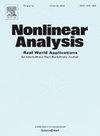Financial models and well-posedness properties for symmetric set-valued stochastic differential equations with relaxed Lipschitz condition
IF 1.8
3区 数学
Q1 MATHEMATICS, APPLIED
引用次数: 0
Abstract
In this paper, stochastic differential equations are considered in the context of set-valued analysis with solutions that are set-valued stochastic processes. The equations were proposed in the so-called symmetrical form. A variety of set-valued stochastic differential equations that extend well-known single-valued models in financial mathematics are presented. The misconception that the solution of a single-valued equation, starting from a point within the initial value of the set-valued equation, will always remain within the solution of the set-valued equation (i.e., it is a selection) is refuted. Then, the symmetric set-valued differential equation in general form is studied. It is assumed that the coefficients of equation satisfy a very general condition, including that of the Lipschitz type, with a function that appears with a certain integral inequality. The result obtained is that there is a unique solution to the equation considered. It is also shown that the solution is stable with respect to small changes in the equation data. The implications for symmetric set-valued random differential equations and deterministic symmetric set-valued differential equations are also stated.
具有松弛Lipschitz条件的对称集值随机微分方程的金融模型和适定性
本文在集值分析的背景下研究随机微分方程,其解是集值随机过程。这些方程是以所谓的对称形式提出的。提出了一系列集值随机微分方程,它们扩展了金融数学中众所周知的单值模型。驳斥了单值方程的解从集值方程的初值内的一点出发,将始终停留在集值方程的解内(即它是一个选择)的误解。然后,研究了一般形式的对称集值微分方程。假设方程的系数满足一个非常一般的条件,包括Lipschitz型的条件,即函数具有一定的积分不等式。得到的结果是所考虑的方程有一个唯一解。结果表明,对于方程数据的微小变化,解是稳定的。对对称集值随机微分方程和确定性对称集值微分方程的意义也作了说明。
本文章由计算机程序翻译,如有差异,请以英文原文为准。
求助全文
约1分钟内获得全文
求助全文
来源期刊
CiteScore
3.80
自引率
5.00%
发文量
176
审稿时长
59 days
期刊介绍:
Nonlinear Analysis: Real World Applications welcomes all research articles of the highest quality with special emphasis on applying techniques of nonlinear analysis to model and to treat nonlinear phenomena with which nature confronts us. Coverage of applications includes any branch of science and technology such as solid and fluid mechanics, material science, mathematical biology and chemistry, control theory, and inverse problems.
The aim of Nonlinear Analysis: Real World Applications is to publish articles which are predominantly devoted to employing methods and techniques from analysis, including partial differential equations, functional analysis, dynamical systems and evolution equations, calculus of variations, and bifurcations theory.

 求助内容:
求助内容: 应助结果提醒方式:
应助结果提醒方式:


